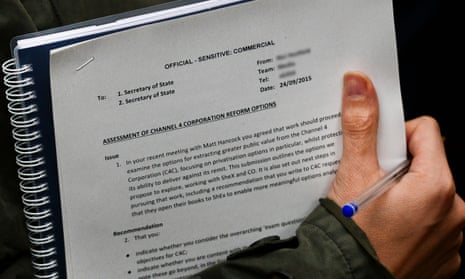The government has inadvertently provided further evidence that it is looking at privatising Channel 4, after an official was photographed entering Downing Street with a document setting out options for a sell-off.
After months of ministerial obfuscation on whether the sale of the state-owned, commercially funded broadcaster was being considered, the document reveals that proposals have already been drawn up in a bid to raise an estimated £1bn for Treasury coffers.
The leaked document reads: “Work should proceed to examine the options of extracting greater public value from the Channel 4 corporation, focusing on privatisation options in particular.”
With the author of the work identified as a senior civil servant within the Department for Culture, Media and Sport (DCMS), the leak suggests that it is the culture secretary, John Whittingdale, who is keenest on the move despite several speeches in recent weeks in which he appeared to deny any decision.
Asked about the talks, one Tory insider said: “John Whittingdale is interested and wants to do it.” The other minister named as part of the discussions was Matthew Hancock, the Cabinet Office minister.
The report does include several other options including “do nothing”, but the report’s introduction suggests that the government is keen to raise funds from a sale of the 32-year-old channel.
Dated 24 September, the document suggests that as a next step the government should write to Channel 4 asking the broadcaster to open its books to enable “more meaningful options analysis”.
In a statement, the DCMS said: “The government has made no decisions regarding reform of Channel 4. Channel 4 has an important remit and we are looking at a range of options as to how to continue to deliver this, including options put forward by Channel 4.”
Channel 4 executives have been opposed to any move to privatise the broadcaster. The options being drawn up by its chairman, Lord Burns, are understood to focus on continuing as a not-for-profit operation.
A Channel 4 representative said: “Channel 4’s not-for-profit model enables it to deliver significant public value to viewers and the UK economy with a unique remit focused on innovation, diversity and new talent.”
In August, Whittingdale told the Guardian Edinburgh international television festival that a sale of Channel 4 was not currently being discussed.
However, he did not reject the idea outright, going on to say that, whatever the channel’s future, its remit to cater for minority audiences and take risks must not change.
“The ownership of Channel 4 is not currently under debate. Do I say there are no circumstances in which I would ever consider it? No I don’t,” he said. “What I do say is the remit of Channel 4 is a priority and it’s not going to change.”
Channel 4’s remit to cater for minority audiences and take risks is considered by some within the broadcaster as the greatest challenge to privatisation.
The leaked picture, taken by Steve Back on Thursday, will embarrass Whittingdale, who is talking to Hancock about the plans to raise money from the broadcaster.
Both the Shareholder Executive, which owns the state’s assets, and the Cabinet Office is involved in the discussions.
Last month, the Guardian reported that Burns was understood to be looking at options for a partial or full sell-off of the broadcaster.
Burns, a former Treasury economist and chair of Santander bank, is believed to be preparing various proposals that would allow Channel 4 to maintain its remit to provide distinctive public service programming in the event of a sale.
It is not clear whether Burns, also the author of several landmark government reports on broadcasting and economic issues, was asked by the government to consider various options or the review is a pre-emptive measure that could be used to defend the broadcaster if it were to be sold.

Comments (…)
Sign in or create your Guardian account to join the discussion